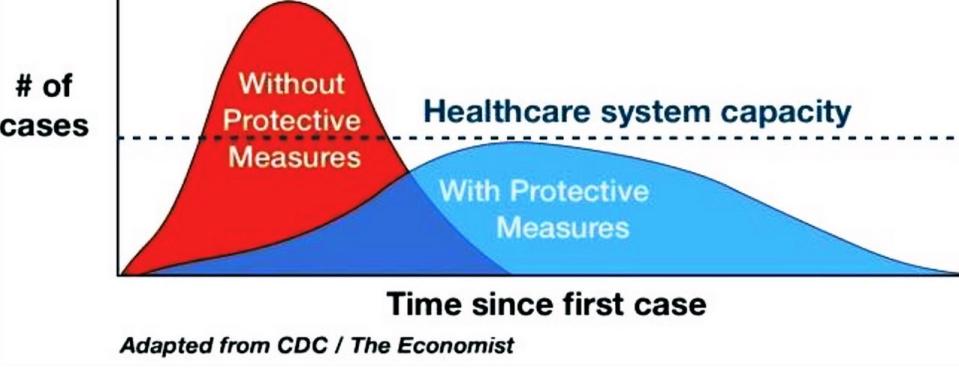Coronavirus crisis: Health care workers sound alarm from 'the front lines'
The coronavirus pandemic has taken the lives of over 10,000 individuals across the world, and sickened over 200,000. In the U.S., the number of confirmed cases continues to rise as more testing kits become available.
As the virus spreads, some hospitals could soon be overwhelmed by the number of coronavirus patients.
“One, we don’t have the real estate to house these patients,” Marcia Santini, a nurse at UCLA’s hospital in Westwood, told Yahoo Finance. “Two, staffing. If we start getting sick, if we’re not protected, if hospitals don’t provide the proper personal protective gear, we are going to get sick. And hospitals have been known to hoard these supplies because they’re afraid of running out.”

‘We’re on the front lines’
NBC News surveyed with more than 250 health care professionals across the country and found that there is a dire need for more personal protective equipment (PPE) in American hospitals.
“I don’t feel like my hospital is failing us,” a nurse in Michigan said. “It’s the whole system that’s failing us.”
Furthermore, amid the deluge of infected patients, health care workers are contracting the virus — even with proper PPE equipment.
“We’re on the front lines and we’re going to respond in the best way we can to any and all folks who show up,” Dr. Glenn Raup, the executive director of Emergency Behavioral and Observation Services at St. Joseph Hospital in California, told Yahoo Finance. “If you really are that concerned, make that call ahead to your doctor, to your urgent care, to your ER, and ask questions because it might save you a trip coming in.”

As the pressure increases, health care workers on are faced with an increasingly intense situation.
“The most striking part is the speed with which it has ramped up,” Ben McVane, an emergency room doctor at Elmhurst Hospital Center in Queens, told the New York Times. “It went from a small trickle of patients to a deluge of patients in our departments.”
New York is being hit particularly hard: On Saturday, the state became the first in the country to reach 10,000 confirmed cases.
“We’re getting pounded,” Mangala Narasimhan, a doctor at the Long Island Jewish Medical Center, part of Northwell Health, the largest hospital system in New York, told the Wall Street Journal. “I’ve been in ICU care for 15 years, and this is the worst I have ever seen things.”

‘I’m sure you’ve seen people talk about the curve’
One major challenge for health care professionals is the lack of available testing kits for the virus.
“We know that at the federal, state, and local levels, there’s every effort to provide us with adequate numbers of tests,” Raup said. “But, as those processes are being implemented, that does make it a challenge for us to be able to properly screen and ensure that individuals are being tested.”
Several states and cities have taken drastic measures, which can help “flatten the curve” and slow down the spread of infections so that health care professionals and other officials have time to properly respond.
“I’m sure you’ve seen people talk about the curve,” Marcia Santini, a nurse at UCLA’s hospital in Westwood, told Yahoo Finance. “If we don’t flatten that curve, what’s going to happen is there’s going to be a majority of us that are going to get sick. And if you have a strong immune system, you’re going to fight it off. It’s not going to be a horrible ordeal.”

‘If we don’t each do our part, it’s going to spread like wildfire’
Although nurses are trained for crises like these, Santini said “this one is a little bit different.”
“The challenges that we’re having with this one is that it was rapid,” she told Yahoo Finance. “It’s a rapid spreading virus. It’s a new virus that the body has never seen. So, we have a little bit of a different ballgame with this one.”
Santini’s message to the public is: “Each one of us has a role in the fight and this is a battle against a pathogen that we’ve never seen. And if we don’t each do our part, it’s going to spread like wildfire.”
This includes properly washing your hands, avoiding touching your face, and most importantly, social distancing. Public health officials have stressed the importance of social distancing, which means avoiding physical social interactions as much as possible, as it can help prevent further community spread.
—
Adriana is a reporter and editor for Yahoo Finance. She can be reached at adriana@yahoofinance.com. Follow her on Twitter @adrianambells.
READ MORE:
Coronavirus pandemic shows 'dysfunctionality' of US health care: Bernie Sanders
Former Obama official on coronavirus: 'Both the president and Congress are utterly failing'
Read the latest financial and business news from Yahoo Finance
Follow Yahoo Finance on Twitter, Facebook, Instagram, Flipboard, SmartNews, LinkedIn, YouTube, and reddit.
